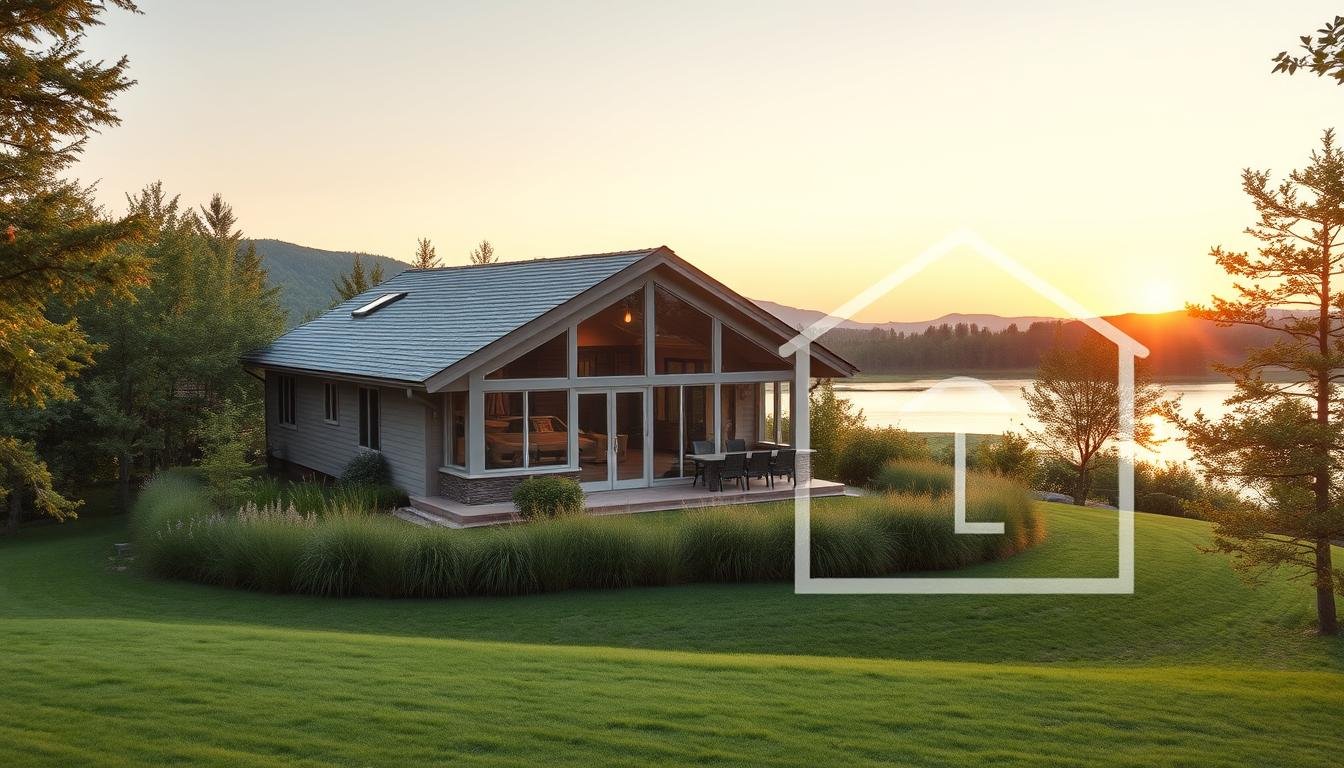Did you know vacation home ownership in the U.S. has grown by over 50% in ten years? With millions of Americans now enjoying their own getaway, the need for good vacation home insurance is more important than ever. In this guide, we’ll cover the key coverages and things to think about for your vacation home. We’ll talk about protecting your property, personal items, and even your rental income. We’ll also look at liability protection and other important insurance needs for your special retreat.
Key Takeaways
- Understand the unique risks associated with seasonal occupancy and exposure to natural disasters for vacation homes.
- Recognize the limitations of standard homeowners insurance when it comes to protecting your vacation property.
- Ensure your vacation home’s structure is adequately covered, including the dwelling and any detached structures.
- Protect yourself from personal liability and guest medical expenses related to your vacation home.
- Safeguard your personal belongings and insure against loss of rental income if you offer your home as a short-term vacation rental.
Understanding the Unique Risks of Vacation Homes
Vacation homes have special insurance needs compared to main homes. They face risks like being empty for long times and being hit by natural disasters. They need special coverage to keep your investment safe.
Seasonal Occupancy Patterns
Vacation homes are often empty for weeks or months. This makes them targets for theft, vandalism, and damage from the environment. Absentee homeowner insurance policies help protect these homes when they’re not being used.
- Keeping up with maintenance and security is key to avoiding risks when no one is there.
- Checking for things like burst pipes and roof leaks can stop expensive damage when the home is empty.
Exposure to Natural Disasters
Coastal vacation home risks and mountain cabin safeguards are important for secondary homes. Homes near places prone to hurricanes, wildfires, or other disasters need special insurance. This is to guard against big losses.
| Coastal Vacation Homes | Mountain Cabins |
|---|---|
| Flood insurance, wind/hail coverage | Wildfire protection, snow/ice damage |
| Elevated premiums due to heightened risk | Accessibility and remote location challenges |
Knowing these special needs is key to picking the right vacation home insurance. It helps protect your investment and gives you peace of mind.
Vacation Home Insurance Essentials
Owning a vacation home is exciting but requires special insurance care. You’ll need certain coverages to protect your investment property. Let’s look at the key parts of a good vacation home insurance policy.
Your policy should have dwelling coverage first. This covers your vacation home’s structure. It helps with repairs or rebuilding if there’s damage or a total loss. Also, personal liability coverage is key. It protects you from lawsuits if someone gets hurt on your property.
- Dwelling coverage: Protects the physical structure of your vacation home
- Personal liability coverage: Safeguards you from liability claims if someone is injured on your property
Personal property coverage is also vital. It guards your vacation home’s items, like furniture and appliances. This coverage helps replace these items if they’re stolen, damaged, or lost.
Lastly, think about extra coverages like loss of rental income and flood insurance. These can add extra protection for your vacation home insurance essentials. They’re especially useful for vacation homes, which face unique risks.
| Coverage Type | What It Protects |
|---|---|
| Dwelling Coverage | The physical structure of your vacation home |
| Personal Liability Coverage | Financial responsibility for injuries on your property |
| Personal Property Coverage | Your belongings inside the vacation home |
| Loss of Rental Income | Your vacation rental income stream |
| Flood Insurance | Damage from floods and natural disasters |
Knowing these vacation home insurance essentials helps protect your investment property. This ensures your peace of mind and financial safety.
Homeowners Insurance: Limitations for Vacation Properties
Your primary homeowners insurance might cover some of your vacation home. But, there are key limits you should know. Your vacation property needs special protection that goes beyond your main residence.
Understanding Primary Residence Coverage
Your standard homeowners policy covers your main home and stuff. But, it might not fully protect your secondary home. Vacation homes face special risks like seasonal use and natural disasters. These aren’t covered by your main home policy.
- Limited coverage for personal property at the vacation home
- Reduced liability protection for incidents occurring at the secondary property
- Potential gaps in coverage for damage or loss during periods of vacancy
To fully protect your vacation home, you need a custom secondary home protection policy. It should handle the unique needs and risks of a part-time or absentee home.
“Homeowners insurance for a vacation property is often more complex than coverage for a primary residence.”
Knowing your primary policy’s limits helps you choose the right insurance for your vacation home. This ensures your investment is safe, whether it’s a beach house or a mountain cabin.
Dwelling Coverage: Protecting Your Vacation Home’s Structure
Insuring your vacation home’s structure is key. Dwelling coverage protects the building from various risks. It’s a vital part of vacation home insurance.
Replacement cost is a crucial part of dwelling coverage. It ensures your insurance pays to rebuild or repair your home. This is especially important for older or custom homes, where rebuilding costs might be higher than the current value.
It’s also important to have coverage limits that match your home’s true replacement cost. The size, materials, and location of your home affect this. Having enough coverage is key to avoid unexpected costs if you need to make a claim.
| Dwelling Coverage Considerations | Why It Matters |
|---|---|
| Replacement Cost | Ensures your policy will pay to rebuild or repair your vacation home to its pre-loss condition. |
| Coverage Limits | Adequate limits are essential to avoid underinsurance and unexpected expenses after a covered loss. |
| Endorsements | Additional coverage options, such as extended replacement cost, can provide enhanced protection. |
Also, vacation home insurance policies may offer extra coverage. For example, an extended replacement cost endorsement can give you more coverage. This helps ensure your home can be fully rebuilt after a major loss.
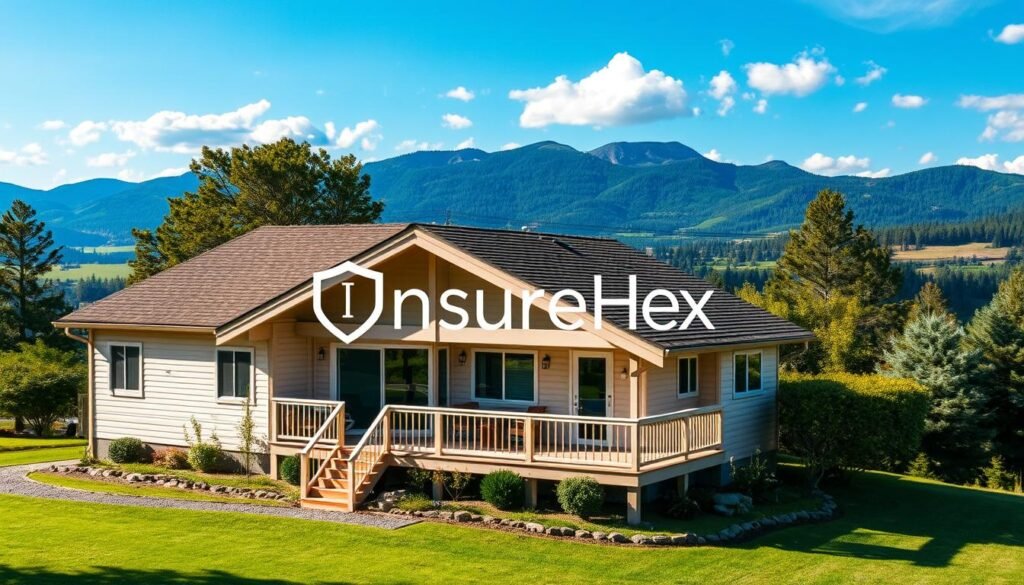
Understanding dwelling coverage helps tailor your insurance to protect your investment. Review your policy and work with your insurance provider. This ensures your vacation home is well-protected.
Personal Liability Protection for Vacation Homeowners
Owning a vacation home means you face more risks, like guest injuries or property damage. It’s key to have the right personal liability coverage to protect your money. This coverage helps with lawsuits and legal costs if someone gets hurt on your property.
Guest Medical Payments Coverage
Guest medical payments coverage is a must-have for vacation home insurance. It helps pay for medical bills if a guest gets hurt, no matter who’s at fault. This keeps your guests happy and avoids legal problems.
The usual limit for this coverage is between $1,000 and $5,000 per person. It’s especially useful if your home is far from hospitals. It ensures your guests are safe and you can relax knowing they’re covered.
| Coverage Type | Typical Limit | Key Benefits |
|---|---|---|
| Personal Liability | $300,000 to $1,000,000 | Protects against lawsuits and legal fees |
| Guest Medical Payments | $1,000 to $5,000 per person | Covers medical expenses for injured guests |
Investing in vacation rental coverage and short-term rental liability is smart. It keeps your vacation home safe and your finances sound. With this coverage, you can welcome guests with confidence, knowing you’re protected.
Insuring Personal Belongings in Your Vacation Home
Protecting your personal property is key when it comes to vacation home insurance essentials. Your vacation home likely has valuable items like furniture, electronics, and sports gear. It’s important to make sure your investment property coverage includes these items to protect your investment.
Start by making a list of everything valuable in your home. Include things like art, antiques, and the latest gadgets. This list will help you figure out how much coverage you need.
Don’t forget about sentimental items like family heirlooms and keepsakes. These items are just as important as your other belongings. Work with your insurance provider to make sure your policy covers these special items.
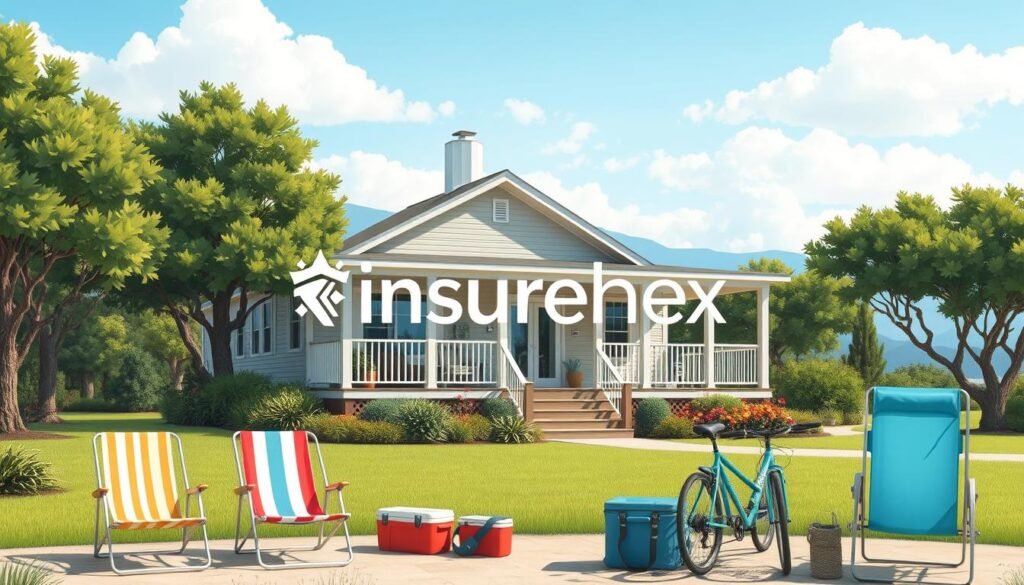
Keep records and receipts for your belongings. These can be very helpful if you need to make a claim. They help prove the value of your items if they get damaged or lost.
Getting the right vacation home insurance essentials is important. It helps protect your home and its valuable items. By understanding the value of your belongings and getting the right coverage, you can enjoy your vacation home without worry.
Additional Living Expenses: A Crucial Safety Net
As vacation home owners, we know how vital it is to protect our secondary homes. One key part of vacation home insurance often missed is additional living expenses coverage. This coverage acts as a safety net when disaster hits and your vacation home is no longer habitable.
Picture this: a fire or severe storm damages your vacation property, making it unsafe to live in. Additional living expenses coverage can help pay for temporary living costs. This includes hotel stays, meals, and other needs while your home is being fixed. It’s a big help, keeping your savings safe and your life uninterrupted during tough times.
| Coverage | Description |
|---|---|
| Additional Living Expenses | Covers the extra costs of living away from your vacation home when it’s damaged and uninhabitable, such as hotel stays, meals, and transportation. |
| Fair Rental Value | Reimburses you for lost rental income if your vacation home can’t be rented out due to a covered loss. |
| Debris Removal | Pays for the cost of removing debris and damaged materials from your vacation property after a covered event. |
When looking at your vacation home insurance essentials, don’t forget about additional living expenses coverage. This coverage is crucial for protecting your secondary home protection in case of an unexpected disaster. It gives you the financial support to keep your lifestyle going while your vacation home is being fixed.
“Having additional living expenses coverage gave us peace of mind when our vacation home was damaged by a hurricane. It allowed us to continue our vacation plans without the added stress of unexpected costs.”
- Understand the importance of additional living expenses coverage for your vacation home.
- Review your policy to ensure you have adequate limits for temporary relocation and lost rental income.
- Consider increasing your coverage limits to provide maximum protection for your secondary residence.
Protecting Your Vacation Rental Income Stream
As vacation rental owners, we know how vital it is to protect our property’s income. That’s why vacation rental coverage and loss of rental income coverage are key. These policies act as a safety net, shielding us from financial hits from unexpected events.
Loss of Rental Income Coverage
One major benefit of vacation rental insurance is covering lost rental income. This kicks in if our property is damaged and can’t be rented out. With this coverage, we can be sure our income is protected, even when our home is not available.
The coverage amount depends on our rental’s expected income. It helps us keep up with expenses like mortgage and utilities while we fix our property.
| Coverage Type | Protects Against | Potential Benefits |
|---|---|---|
| Loss of Rental Income | Unexpected events that disrupt occupancy and revenue | Maintains cash flow, covers expenses during property downtime |
| Short-Term Rental Liability | Lawsuits, injuries, or damages caused by guests | Protects against financial liability, covers legal costs |
We should also think about short-term rental liability insurance. It guards us against financial hits from guest issues like injuries or property damage. With this, we can handle the unique risks of running a vacation rental with more confidence.
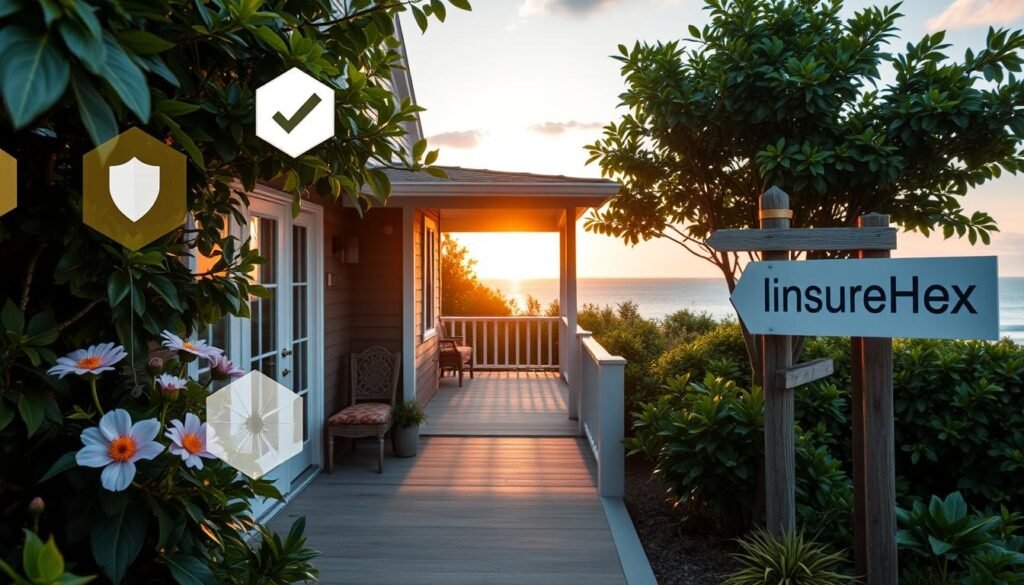
“Protecting our vacation rental’s earning potential is crucial. Loss of rental income coverage and short-term rental liability insurance can provide the peace of mind we need to operate our investment property with confidence.”
Vacation Home Insurance for Coastal Properties
Owning a vacation home by the coast is a dream. But, it comes with risks that need special insurance. Coastal homes face dangers like hurricanes and flooding, which can damage your property and belongings. It’s key to know these coastal vacation home risks to protect your investment and keep your family safe.
When insuring your coastal vacation home, choose an agency with many insurance options. This lets you find the best coverage for your needs. An experienced agency can make sure your home is well-protected against coastal challenges.
Flood coverage is a must for coastal homes. Most homeowner’s policies don’t cover flood damage. So, you need a separate flood insurance policy. This extra coverage helps you recover faster if a flood hits.
If you rent out your coastal home, think about liability risks. The right liability coverage can protect you from lawsuits. It keeps your finances safe if something happens on your property.
Coastal vacation homes offer a unique and rewarding experience. But, they need special care to be well-protected. By working with an experienced agency and understanding the coastal vacation home risks, you can enjoy your beachfront or oceanfront home with peace of mind.
Insuring Mountain Cabins and Remote Vacation Homes
Insuring mountain cabins and remote vacation homes comes with unique challenges. These off-grid retreats face higher risks. They need special coverage for the right mountain cabin safeguards.
Off-Grid Property Considerations
Mountain cabins and secluded vacation homes have their own set of risks. They might be hard to get to, exposed to harsh weather, and use different power sources. It’s crucial to plan well and get the right insurance to protect your investment and keep your mind at ease.
- Accessibility issues: Remote locations may hinder emergency response times and complicate repairs.
- Natural disaster risks: Mountain cabins face elevated threats from events like wildfires, landslides, and heavy snowfall.
- Alternative power sources: Reliance on generators, solar, or off-the-grid utilities requires specialized protection.
When insuring your mountain cabin, choose an insurer that gets the unique challenges. Good coverage can protect your retreat and give you peace of mind to enjoy your time away.
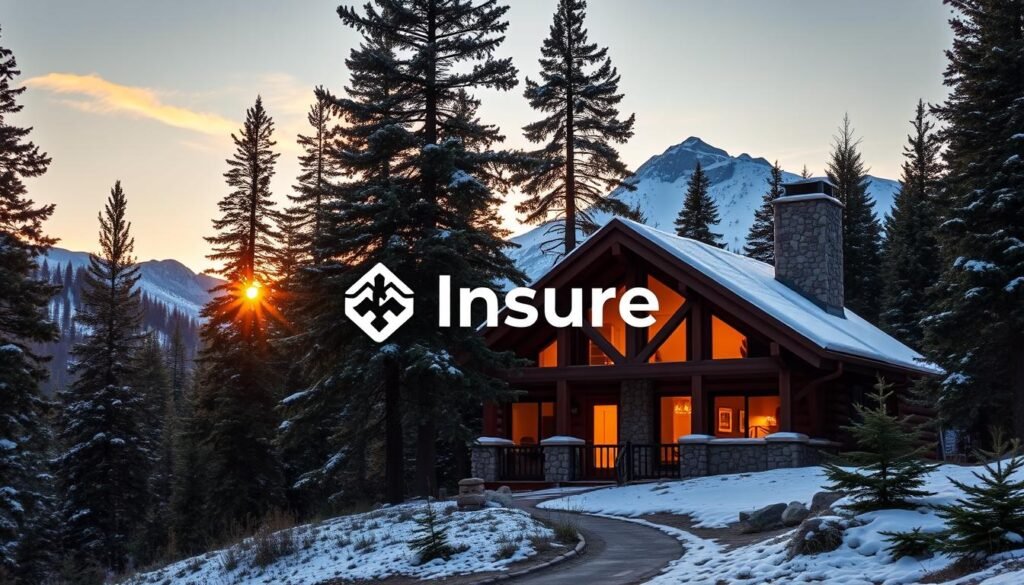
“Protecting your mountain cabin or remote vacation home requires carefully evaluating the risks and finding the right insurance coverage to match your needs.”
Umbrella Policies: Extra Protection for High-Value Homes
For those with high-value vacation homes, an umbrella insurance policy is key. It gives you extra liability protection. This policy covers more than your primary home insurance, protecting you from huge legal costs and judgments.
Umbrella policies are great for vacation home owners. These homes are valuable, both financially and emotionally. A good umbrella policy keeps your vacation home insurance essentials and investment property coverage safe. It helps protect your money in case of unexpected events or lawsuits.
Understanding Umbrella Insurance
An umbrella policy is extra liability coverage on top of your home and auto insurance. It starts at $1 million and can go up to $5 million or more. This extra protection is crucial for your peace of mind.
- Covers legal fees and damages that exceed your primary insurance limits
- Protects your assets, like your vacation home, from being taken to pay judgments
- Offers worldwide coverage for liability claims, even when you’re not at your vacation property
Umbrella policies are especially good for vacation home owners. These homes are often very valuable. Adding an umbrella policy to your insurance gives you more peace of mind and protection for your investment.
| Coverage | Primary Home Insurance | Umbrella Policy |
|---|---|---|
| Liability Limits | Typically $300,000 to $500,000 | $1 million to $5 million or more |
| Legal Fees | Covered up to policy limits | Covered beyond primary policy limits |
| Worldwide Coverage | Limited to your primary residence | Extends to your vacation home and travels |
Investing in an umbrella policy is smart. It protects your vacation home insurance essentials and investment property coverage. This ensures your financial safety and peace of mind, wherever you go.
Seasonal Coverages: Adjusting for Occupancy Changes
Vacation homes often see changes in who uses them throughout the year. As seasonal property insurance providers, we know how key it is to adjust your coverage. This ensures your property is safe, no matter how often it’s used.
Getting a part-time residence policy is a wise choice for vacation home owners. This policy lets you change your coverage and premiums based on when your home is used or empty. This way, you get the best protection and avoid paying too much when it’s not in use.
When looking at your vacation home insurance, think about a few things:
- How often is your home used, and when?
- What do you do to keep your home safe when it’s empty?
- Is your vacation home in an area that’s hit by certain natural disasters?
By looking at these points, you can work with your insurance company. Together, you can make a seasonal property insurance plan that fits your needs. This can help you save money and keep your investment safe all year.
“Protecting your vacation home is about more than just the structure – it’s about adapting to the ebb and flow of how you use it.”
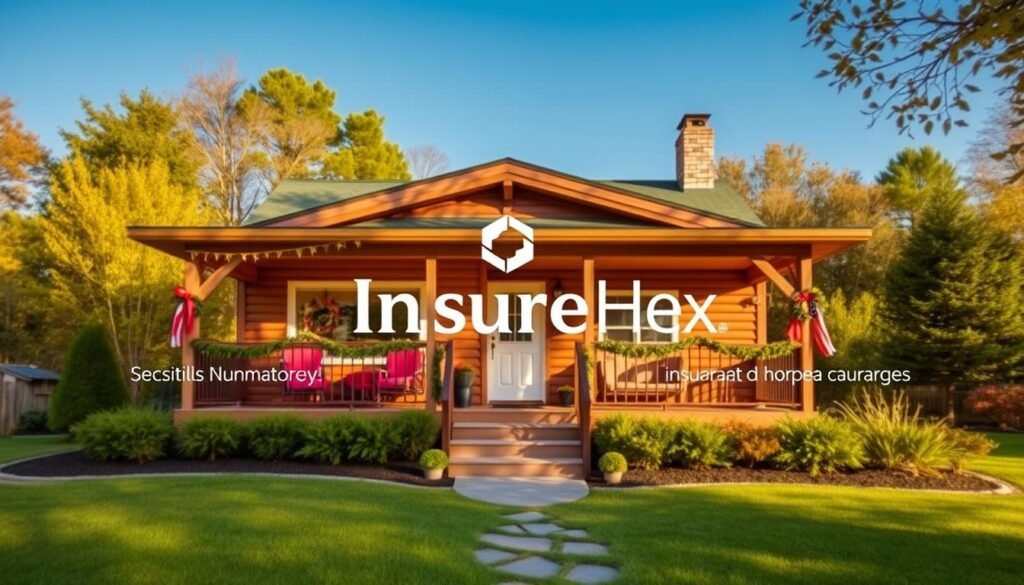
| Occupancy Level | Recommended Coverage |
|---|---|
| Peak Season | Full homeowners insurance |
| Off-Season | Reduced coverage for vacant property |
| Short-Term Rental | Vacation rental insurance |
By understanding your vacation home’s unique insurance needs and adjusting your part-time residence policy accordingly, you can rest easy. Your investment will be protected, no matter the season.
Vacation Home Insurance for Short-Term Rentals
If you rent out your vacation home, you need special vacation rental coverage. This coverage helps with risks like short-term rental liability and property damage. The right insurance protects your investment.
Liability Risks of Short-Term Rentals
Hosting short-term guests can lead to liability risks. These include:
- Injuries or accidents involving your guests
- Damage or theft of your home’s contents or structure
- Noise complaints or disturbances that lead to legal issues
- Liquor liability if your guests consume alcohol on the property
A good vacation rental insurance policy offers vital liability coverage. It protects your financial interests and gives you peace of mind.
| Coverage Type | Benefit |
|---|---|
| Commercial Liability | Protects against claims of bodily injury or property damage to guests |
| Building and Contents | Covers damage to the vacation home’s structure and personal belongings |
| Business Income | Provides reimbursement for lost rental revenue due to a covered event |
Investing in the right vacation rental coverage is key. It safeguards your investment and ensures your business runs smoothly, even with unexpected challenges.
Natural disaster insurance: protection against storms & natural catastrophes
Natural disaster insurance: protection against storms & natural catastrophes
Conclusion
Protecting your vacation home with the right insurance is key. It keeps your investment safe and gives you peace of mind. Understanding the risks of vacation homes, like natural disasters, helps us choose the best insurance.
Insurance covers important things like your home, personal liability, and lost rental income. We also look at special options like umbrella policies and short-term rental insurance. Our aim is to give you full coverage so you can enjoy your vacation without worry.
By knowing the vacation home insurance essentials, we can make smart choices for our vacation homes. This way, we can be sure our investments and getaways are safe. We can then fully enjoy owning a vacation property.

